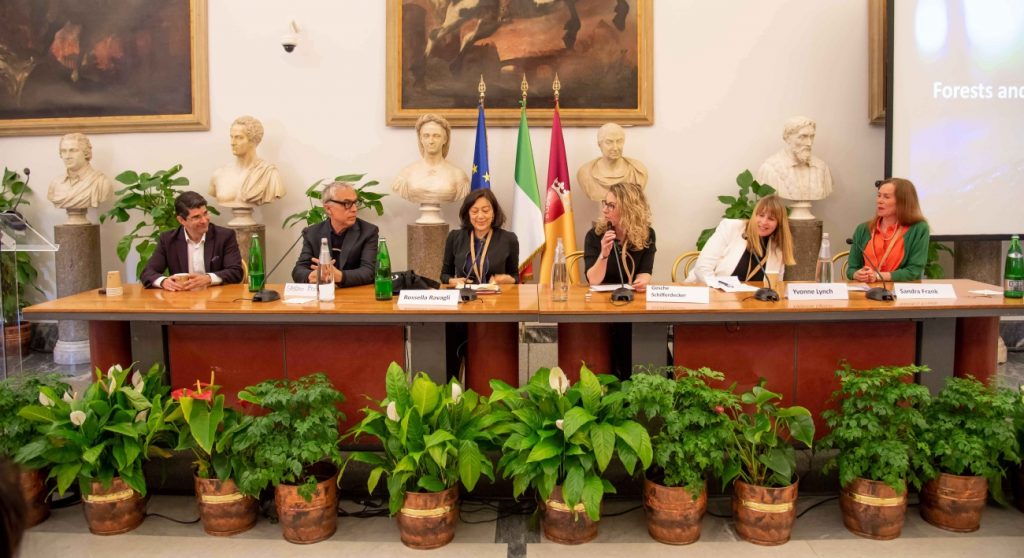The seminar took place in Rome on 20 April, as part of the official launch of EFI’s new Biocities Facility and celebrations of EFI’s 30th anniversary. An interdisciplinary audience of 150 people from research, practice and policy heard how forests are the key structure to transforming cities into ‘biocities’.

EFI Director Marc Palahí set the scene in his keynote speech, explaining how cities can lead the vision of a new economy where life and nature becomes its true engine and purpose. He called for biocities to catalyse a new Renaissance.
“Cities need to lead the transformation, this is clear, because our economic activities and innovation are happening there”, he said. “Cities need to become the change that we want for our world. If we want to shape our economy, we need to shape our cities so that we mirror the future that we want.”
An inspiring panel discussion explored not only the challenges that lie ahead, but also the opportunities, particularly in key sectors like fashion, construction, urban planning and architecture.
Architect Stefano Boeri emphasised the importance of connecting the public and private sectors, and in particular public administration, banks, universities, the private sector and citizens. This was echoed by Marc Palahí, who called for a joint vision with public-private partnerships. Four ‘I’s would be essential – innovation and new business models, infrastructure, institutions and regulations, as well as investments.
Access to finance was a key challenge for implementation, according to Yvonne Lynch, an international green cities expert. She highlighted the transformational role trees can play in cities, and the fact that good long-term planning was crucial, to take account of climate change, species suitability and water efficiency. Overcoming short-term electoral cycles was vitally important, and here the community and their involvement in the decision-making process was key.
For this, the panel agreed that changing mindset was one of the biggest challenges. Societal demand and acceptance and adequate policies are key. Citizens have to demand to live in buildings built with mass timber as well as to consume wood-based materials/textiles that follow circularity ideas and where waste becomes the exception. Rossella Ravagli from Giorgio Armani SPA emphasised the importance of circularity in the fashion industry – it is not a nice-to-have, but a must-have. The fashion sector is very committed now and it can play an important role.
Marc Palahí highlighted that the circular bioeconomy will not succeed unless we reduce consumption and increase efficiency. We need to use wood for the right purposes and move away from use for low-efficient energy eg in the global south. For this, Sandra Frank from Arvet, which specialises in building in wood, said that transferring knowledge and exchanging experiences will be key. It is easy to do what we know, and examples are needed.
Summing up, EFI’s Assistant Director Helga Pülzl emphasized the fact that a new nature-powered circular economy, new and alternative pathways provided by forests and trees for cities as well as societal demand and acceptance and governmental regulations will have to play together to build the cities of the future. It will be important to learn from each other and also to encourage cities to exchange lessons learned to encourage large-scale transformational change. Scientists also need to be pro-active and connect the dots – and this is the role of the new Biocities Facility.
More information
Based on a recent study led by EFI’s Timokleia (Cleo) Orfanidou and Mariana Hassegawa, two EFI Policy Briefs have been published. They look at the environmental impacts of wood-based textile fibres and modern wood buildings.
- Read the policy brief environmental impacts of wood-based textile fibres.
- Read policy brief on environmental impacts of modern wood buildings.
The full programme is available here: https://efi.int/events/grand-opening-efis-biocities-facility-cities-age-forests-2023-04-20/programme
More information about our speakers: https://efi.int/events/grand-opening-efis-biocities-facility-cities-age-forests-2023-04-20/speakers
Source
EFI, press release, 2023-04-26.
Supplier
European Forest Institute (EFI)
Share
Renewable Carbon News – Daily Newsletter
Subscribe to our daily email newsletter – the world's leading newsletter on renewable materials and chemicals











